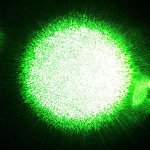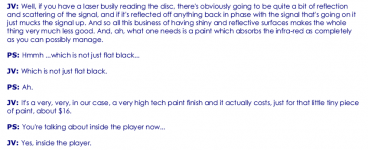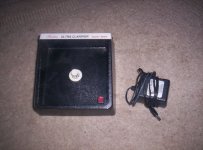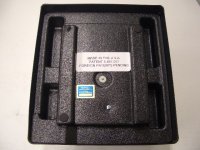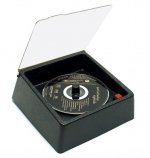Hi bear,Btw, since the laser and photodiode arrays work on the infrared range and are just about totally blind to "blue light" I somehow doubt that it would worsen the S/N. Have you ever put an LED or Laser on a spectrometer and looked at the output? Nothing there out of band. Nada, zilch, zip.
_-_-bear
You're right, no question about it. The optics are infrared coated so there's little else coming in. Although a bare photodiode might have a varying sensitivity across the spectrum when a passband filter is placed in front of it, it will only see that narrow part that we let through. And this is what enables the optical noise reduction. Mainly this noise is due to the so called laser speckle - light scattering when an uneven surface is hit.
If we make an effort to imagine that the next image is infrared instead of green (I wasn't lucky to find at least a red example quickly) and that this is what the photodiode actually sees then the corona of the little focused spot represents the optical noise. With just the right amount of random blue noise the 'corona' becomes violet-ish and is no longer seen by the photodiode. Great... or perhaps not so great, now it is easy to see why a simple LED supplied in DC will not cut it. Also why blue might be better than green: considering our band pass filter violet is further away from IR than orange is.
Btw, did it went well - the laser replacement in your Onkyo?
Attachments
Last edited:
In my previous post I forgot to add the conclusion:
Don't add 12 superbright blue LEDs in your CD tray,...as seen in some chinese offerings.
Too much extra light will cause a spot with a 'pulsating diameter' as the laser hovers over the pits of the CD and this will put the APC circuit of the laser emitter and all the servos on high alert! Overall the reading S/N ratio will suffer.
Don't add 12 superbright blue LEDs in your CD tray,...as seen in some chinese offerings.

Too much extra light will cause a spot with a 'pulsating diameter' as the laser hovers over the pits of the CD and this will put the APC circuit of the laser emitter and all the servos on high alert! Overall the reading S/N ratio will suffer.
I'm not defending this overpriced product, but have you guys ever noticed how out of balance cd's are? I'm guessing the device will true up the disc edges. [snip]
You're guessing, yes. I'm guessing bevelling the edges increases wobble. Also, I cannot understand that wobble would worsen the sound, what with all tracking servo's and error correction.
jd
Unfortunately, if you look at error rate, none of these nostrums makes the slightest bit of difference. I remember Peter van Willenswaard doing this measurement for a variety of CD snake oil treatments and finding... zero difference.
Likewise, when I monitored error rate (we're talking interpolation errors) using my old, cheap Magnavox unit, I couldn't find more than one or two discs that had more than one error. And even at two or three errors per disc, that does NOT translate into any sound quality difference, any more than two or three ticks per LP translates into a sound quality difference.
The hand-waving, speculation, and rationalization in the complete absence of any analog signal measurement or (even more important) controlled listening test is amazing to me.
Perhaps it's unfair, but I have a rule of thumb that says if something is reviewed in 6 Moons, it's most likely snake oil. (My apologies to Steve Eddy, whose transformer product actually worked and got a good review there)
Likewise, when I monitored error rate (we're talking interpolation errors) using my old, cheap Magnavox unit, I couldn't find more than one or two discs that had more than one error. And even at two or three errors per disc, that does NOT translate into any sound quality difference, any more than two or three ticks per LP translates into a sound quality difference.
The hand-waving, speculation, and rationalization in the complete absence of any analog signal measurement or (even more important) controlled listening test is amazing to me.
Perhaps it's unfair, but I have a rule of thumb that says if something is reviewed in 6 Moons, it's most likely snake oil. (My apologies to Steve Eddy, whose transformer product actually worked and got a good review there)
I find it troubling how people simply crap on an idea just because it is unorthodox or illogical.
You left out, "...and unsupported by data." That's very, very important.
[snip]I find it troubling how people simply crap on an idea just because it is unorthodox or illogical.[snip]
Hmm. Would you be more comfortable if your president would take a decision on, say, your taxes on an idea that is unorthodox / illogical and devoid of any supporting data?
jd
Hmm. Would you be more comfortable if your president would take a decision on, say, your taxes on an idea that is unorthodox / illogical and devoid of any supporting data?
jd
I thought that was what the US did.
Likewise, when I monitored error rate (we're talking interpolation errors) using my old, cheap Magnavox unit, I couldn't find more than one or two discs that had more than one error.
I had the old Magicbox with the pop up lid and did the same thing with the same result. I even tried touching the CD and it took noticeable disturbance to light up the error detector pin. I also scratched up a CD until there were plenty of errors and it looked BAD.
If you actually examine the optical path and do some calculations you would see the scattered light theory does not hold water. BTW take one apart some time and ask yourself how this could cost <$2.
Planet10 is right on one thing the scratched unplayable CD rips with 1 error on a CDROM even at 8X.
I still go with my magic green magic marker on the rim of the CD! 
I don't know about stochastic resonance principles, but I do know about sarcastic processing.
Any special paint used on the innards of the laser pickup device would be selected to be black at the specific IR light frequency. What looks black to the human eye may not be black at that IR light frequency. This would improve the contrast of the optical system, just like camera lens barrels and telescope barrels are painted black inside. This may cut the bit error rate down some, but beyond some point, you won't hear any difference, as error correction will mop up the errors.
Demagnetize a CD? There's nothing in a CD that could hold a magnetic field. The metal layer is aluminum, which isn't at all magnetic.
I don't know about stochastic resonance principles, but I do know about sarcastic processing.
Any special paint used on the innards of the laser pickup device would be selected to be black at the specific IR light frequency. What looks black to the human eye may not be black at that IR light frequency. This would improve the contrast of the optical system, just like camera lens barrels and telescope barrels are painted black inside. This may cut the bit error rate down some, but beyond some point, you won't hear any difference, as error correction will mop up the errors.
Demagnetize a CD? There's nothing in a CD that could hold a magnetic field. The metal layer is aluminum, which isn't at all magnetic.
Besides, there are those who would demand any CD player or amp that was not the bottom of the line cheapest thing out there to be included. (I wonder how many of them use pure nitrogen in their tires?)Why is there not a section on the forum for ""Snake Oil """???
.
Even though virtually every die hard subjectivist reviewer has a desert island list of CD's.
I should have said relatively speaking...
Sure, I have many cds that sound fine, but not like vinyl or tape. I still say beware of that beveling device - besides being a fraud and stupid costly, there is a real possibility it will ruin a cd.
John
"The Bedini Ultra Clarifier is the ultimate amusement-park ride for your CDs" - claims Mr. Kevin Hunt.
Again another (a complete for me new) approach by same handling;
"Through its patented Electro Magnetic Beam Configuration, the Clarifier polarizes the polymer in such a way as to maximize the laser's ability to retrieve stored data."
Read more there:
Q & A
and there:
BEDINI ELECTRONICS, INC..
and US-patent 5487057
Patent US5487057
Again another (a complete for me new) approach by same handling;
"Through its patented Electro Magnetic Beam Configuration, the Clarifier polarizes the polymer in such a way as to maximize the laser's ability to retrieve stored data."
Read more there:
Q & A
and there:
BEDINI ELECTRONICS, INC..
and US-patent 5487057
Patent US5487057
Attachments
Magnetic? Electric? They can't seem to make up their mind.
Data on their claims? Nonexistent.
Ripoff? Presumably.
Reviewers have even the slightest notion of what they're talking about? Nope.
Are they counting on the gullibility of their customers? Without question.
What's your interest here?
edit: I note that in the 1999 review you linked to, the reviewer promised to do blind tests. Did that ever happen?
Data on their claims? Nonexistent.
Ripoff? Presumably.
Reviewers have even the slightest notion of what they're talking about? Nope.
Are they counting on the gullibility of their customers? Without question.
What's your interest here?
edit: I note that in the 1999 review you linked to, the reviewer promised to do blind tests. Did that ever happen?
Besides, this is now obsolete technology! See US Patent 6058078. This inventor, in describing the Bedini, says, "In the CD tone quality and image quality improving apparatus shown in FIG. 17, the hole in the central portion of a CD is mounted onto a protrusion on the central portion of the demagnetizer, a start switch is depressed to rotate the CD at a high speed of several tens of seconds within the entire magnetic field which consists of the strong magnetic field of a permanent magnet, plus the magnetic field of a coil. This type of apparatus is described in U.S. Pat. No. 5,487,057 (patented on Jan. 23, 1996) in detail. However, if a magnetized information recording disc is rotated at high speed, as in the prior art apparatus mentioned above, it functions as a kind of dynamo thereby shaking its surroundings and inducing an electromotive force to surrounding wires, the power supply, and causing jitters."
Do you really want a device shaking the surroundings and causing the jitters? I sure don't. Thank goodness someone has stepped in and fixed that severe problem!
Do you really want a device shaking the surroundings and causing the jitters? I sure don't. Thank goodness someone has stepped in and fixed that severe problem!
I'm no expert in DBT but here's how I would do the test.
Rip a good quality CD with a properly configured copy of EAC and write down the CRC.
'Demagnetize' or whatever the device claims to do the same CD and repeat above action.
If both CRC's match, nothing changed with the CD.
If not, turn the 'Cook' button a little lower. (If there is one, hint...)
(Might have been mentioned before, I admit I only responded quickly by looking at the thread title and a diagonal read)
Rip a good quality CD with a properly configured copy of EAC and write down the CRC.
'Demagnetize' or whatever the device claims to do the same CD and repeat above action.
If both CRC's match, nothing changed with the CD.
If not, turn the 'Cook' button a little lower. (If there is one, hint...)
(Might have been mentioned before, I admit I only responded quickly by looking at the thread title and a diagonal read)
..................
Demagnetize a CD? There's nothing in a CD that could hold a magnetic field. The metal layer is aluminum, which isn't at all magnetic..........
Not quite true......
Plastic magnet - Wikipedia, the free encyclopedia
Plastic magnet breaks the mold - CNET News
I also remember when I was at Uni. in the early '70s, one of the postgraduate students was working on bubble memory (I think), exploring magnetism in the bubbles in plastic extrusions.
Andy
.
Last edited:
- Status
- This old topic is closed. If you want to reopen this topic, contact a moderator using the "Report Post" button.
- Home
- Source & Line
- Digital Source
- The Ultimate Sound Improving for Compact Disc's through Patent-Pend.CD Sound Improver
